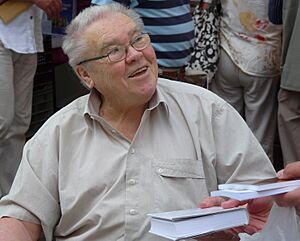István Csurka facts for kids
Quick facts for kids
István Csurka
|
|
|---|---|

Csurka at Bookfests in Budapest, June 2011
|
|
| Member of the National Assembly | |
| In office 2 May 1990 – 28 June 1994 |
|
| In office 18 June 1998 – 14 May 2002 |
|
| Chairman of the Hungarian Justice and Life Party | |
| In office 15 July 1993 – 4 February 2012 |
|
| Preceded by | New party |
| Succeeded by | Zoltán Fenyvessy |
| Personal details | |
| Born | 27 March 1934 Budapest, Hungary |
| Died | 4 February 2012 (aged 77) Budapest, Hungary |
| Political party | MDF (1987–1993) MIÉP (1993–2012) |
| Children | Endre István Eszter Dóra |
| Occupation | politician |
| Profession | writer |
István Csurka (born March 27, 1934 – died February 4, 2012) was an important Hungarian politician, writer, and journalist. He was known for his strong nationalistic views, meaning he deeply believed in protecting and promoting Hungary's culture and interests. He founded and led a political party called the Hungarian Justice and Life Party (MIÉP) from 1993 until he passed away. He also served as a Member of Parliament, which means he was elected to help make laws for Hungary, from 1990 to 1994 and again from 1998 to 2002.
About István Csurka
István Csurka was born in Budapest, Hungary, on March 27, 1934. His father, Péter Csurka, was also a journalist. István had a younger brother, László Csurka, who became a famous actor and director.
After the Hungarian Revolution of 1956, István Csurka was held by authorities for about six months. He later said he was pressured to become an informant for the secret police during this time. In the early 1990s, he was one of the first people to openly talk about this part of his past.
Political Career
István Csurka was a founding member of the Hungarian Democratic Forum, a political party. He was part of the first Parliament of Hungary elected after the end of the communist era. Before becoming a politician, he was a well-known novelist and playwright. He often wrote things that were critical of the government at the time.
In October 1994, he became the leader of the Hungarian Justice and Life Party (MIÉP). This party described itself as a radical national-conservative group. This means they had very strong ideas about Hungarian identity and traditions. At its most popular, between 1998 and 2002, the party had the support of about 5% of voters.
Csurka was known for his very strong views about Hungarian nationalism. He believed he represented the interests of about 3 million Hungarians who lived outside Hungary. These people were living in other countries after the Treaty of Trianon, which changed Hungary's borders. He also had strong, sometimes controversial, opinions about other groups.
There were rumors that his party, MIÉP, might work with the center-right party called Young Democrats (Fidesz). However, the leader of Fidesz, Viktor Orbán, always said no to this idea. After the elections in April 2002, MIÉP did not get enough votes (they needed 5%) to enter the Hungarian parliament. This made any talk of a partnership irrelevant.
In late 2011, Csurka was chosen to be the intendant (a kind of artistic director) for the Új Színház ("New Theater") in Budapest. This decision was made by the new director, György Dörner, who was connected to the far-right Jobbik party. They planned to create plays that moved away from what Csurka called "liberal-social-cultural policy." Later, István Tarlós, the mayor of Budapest, asked Dörner to rethink hiring Csurka because of Csurka's strong and controversial statements.
Later Life and Death
István Csurka was hospitalized in January 2012. His last public appearance was at a demonstration in Szeged that supported the government. He said that Hungary was facing big threats. He also emphasized that the country needed to stick to the path set by the government, which had strong support.
István Csurka passed away on February 4, 2012, at the age of 77. He had been ill for a long time.
Personal life
István Csurka was married and had three children. He had two daughters named Eszter and Dóra, and one son named Endre István.
 | Charles R. Drew |
 | Benjamin Banneker |
 | Jane C. Wright |
 | Roger Arliner Young |

